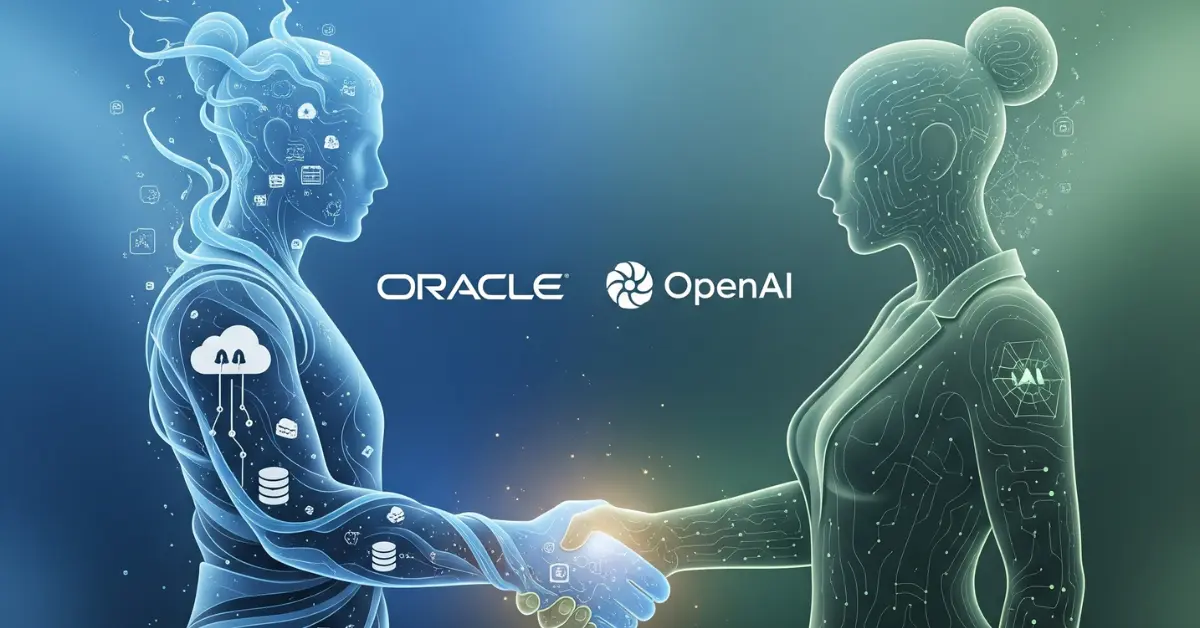By Stepn
Oracle OpenAI deal : In a massive power play, Oracle has signed a $300B deal with OpenAI, challenging Microsoft’s partnership
The landmark Oracle OpenAI deal is shaking up the tech world and launching a new era of competition. Here’s what you need to know about the battle for AI supremacy.
The highly anticipated Oracle OpenAI deal has officially set the stage for one of the biggest tech rivalries in recent history. While many of us were focused on the usual tech giants, a quiet but powerful battle for AI supremacy was brewing. This new, colossal agreement with Oracle has not only sent shockwaves through the industry but also presents a direct challenge to Microsoft, which has long been seen as OpenAI’s most trusted partner.
Oracle OpenAI Deal
The Alliance That Defined AI
For years, the partnership between Microsoft and OpenAI was the foundation of the AI boom. Microsoft invested billions, and in return, OpenAI, the creator of ChatGPT, used Microsoft’s Azure cloud as its primary platform. This symbiotic relationship helped both companies dominate the AI conversation and build some of the most powerful tools the world has ever seen.
But as AI models have grown bigger and more complex, they have an almost insatiable need for computing power. We’re talking about a scale so immense that it requires more electricity and server capacity than a small city.
Oracle’s Giant Move: The “Stargate” Project
Enter Oracle, a company that many saw as a veteran player in the database world. They’ve just made a move that puts them squarely in the center of the AI revolution. According to reports, Oracle has signed a five-year, $300 billion deal to provide OpenAI with the cloud infrastructure it needs. This is one of the largest tech contracts ever.
This isn’t just a standard contract. The deal is linked to a massive AI infrastructure project called “Stargate,” a joint venture with SoftBank, and includes building colossal new data centers in the U.S. dedicated to powering OpenAI’s next-generation projects. This Oracle OpenAI deal is not just about money; it’s a strategic play for dominance in the foundational layer of AI technology.
Why This Matters to You
This is more than just a clash of tech titans; it has real-world implications for how AI is developed and delivered. This “Stargate” project signals a massive shift in the AI landscape:
- The AI Race Is Getting Intense: This move shows that the competition isn’t just about who can build the smartest AI, but who can build the most powerful and efficient infrastructure to run it.
- Diversification Is Key: OpenAI, by bringing in Oracle, is signaling a desire to reduce its reliance on a single partner, which could give it more flexibility and independence.
- New Players Emerge: Oracle is proving that legacy tech companies can adapt and compete with the new giants of the AI world. Their massive investments could reshape the entire industry.
The Broader Implications: What Does This Mean for the Market?
The news of the Oracle OpenAI deal has caused significant ripples. Oracle’s stock has surged, and the deal reinforces the idea that companies with massive physical infrastructure will be the new power players in the AI era. Analysts are already speculating about how this will impact Microsoft’s stock price and its long-term strategy for Azure. The market is now watching closely to see if Microsoft will retaliate with an even more substantial offer to retain its exclusive partnership with OpenAI.
Furthermore, this deal highlights the growing demand for specialized hardware. With AI development moving at a breakneck pace, the need for custom-built, powerful data centers is becoming a critical bottleneck. Companies like Oracle that can deliver on this need are poised to become indispensable to the AI revolution.
What’s Next in the AI Showdown?
This aggressive move puts the ball squarely in Microsoft’s court. While the two companies reportedly signed a new non-binding deal to restructure their relationship and allow for more flexibility, the question remains: how will Microsoft respond to this new challenge? Will they deepen their own investments, or will they have to share the spotlight with a new challenger?
This high-stakes game is only just beginning, and the outcome will determine the future of AI. The way we use our phones, our computers, and even how we work, could be shaped by which company wins this ultimate tech showdown.
Also Read: Why the 2025 Nissan Versa Is Still America’s Cheapest New Car
